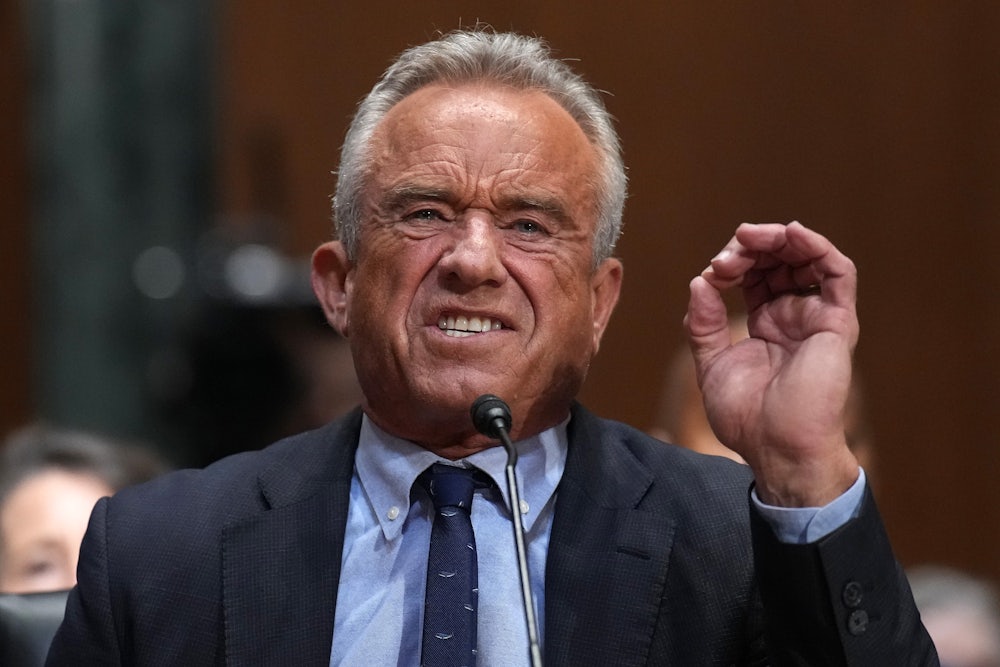On Wednesday, more than 1,000 Health and Human Services employees
demanded, in a letter, that HHS Secretary Robert F. Kennedy Jr. resign. They criticized him for firing Susan Monarez, the director of the Centers for Disease Control and Prevention; severely curtailing access to Covid-19 vaccines; and replacing top public health officials with “political ideologues who pose as scientific experts.” On Thursday, Kennedy
faced senators’ questions about whether he misled them during his confirmation, when he pledged not to do anything “that makes it difficult or discourages people from taking vaccines.”
As some Republicans start to question Kennedy’s fitness for office, there’s also discord brewing among the MAHA stalwarts who have been his greatest boosters, not least for Kennedy’s many full-throated promises to reduce environmental toxins. Since RFK Jr. has been in office, he’s done little of substance to satisfy them. A draft of HHS’s report on children, leaked to the press in mid-August, declined to propose restrictions on ultra-processed foods or pesticides (to the great relief of agricultural interests). As Republicans try to rally MAHA to support them in the midterms, they face the tricky job of balancing that base’s wide-ranging concerns with those of the polluting corporations that have historically poured money into GOP campaigns. Perhaps no issue highlights the gulf between those two factions more than microplastics, the tiny particles showing up at alarming rates in our bodies. The evidence about the dangers of microplastics has been growing steadily. A study published this week finds that significant amounts present in the brain could affect cognition. When exposed to high doses of microplastics through their drinking water for just three weeks, mice that had been genetically modified to be predisposed to Alzheimer’s disease developed symptoms consistent with that condition. Given other recent studies suggesting that the average human brain may now contain a spoonful of microplastics, this is obvious cause for concern, especially when considered in concert with the noxious chemicals leached by plastics production and disposal into nearby communities that face elevated risks of asthma, birth defects, cardiovascular disease, and cancer. While Kennedy deserves some credit for sounding an early warning about microplastics, as Liza Featherstone has written in these pages, he’s done next to nothing to address mounting worries. Instead, he’s stood faithfully by Trump as his administration opens the floodgates for polluters to inject ever more of them into our bodies. Kennedy’s failure to act is particularly striking in light of his previous statements on the issue. While running for president in 2023, he laid out an extensive agenda to stem the flow of plastic waste into “the food we eat, the water we drink, the air we breathe and even our blood,” chastising the Biden administration for failing to “take on the big manufacturers that rack up huge profits recklessly churning out larger amounts of plastic every year.” His 10-point plan included support for limiting the construction of plastic production facilities, curbing fossil fuel subsidies, and even banning fracking; 99 percent of plastics are derived from fossil fuels, and oil and gas companies—reliable Republican donors—have invested heavily in plastics production in recent years as a means to juice demand for their core products. “Communities across America, often in socio-economically disadvantaged areas, have been fighting to protect themselves from plastic facilities,” Kennedy wrote back in 2023. “At a time when it is obvious that we need to reduce plastic, especially single-use items, the oil and petrochemical companies are trying to expand production.” Speaking to a conference convened by the Ocean Plastics Leadership Network in April—seemingly his first time addressing the topic at any length since joining the White House—Kennedy struck a more conciliatory tone. “I don’t want to drag along industry kicking and screaming,” he said. After citing “disturbing” studies about the effect of microplastics on human health, Kennedy was careful not to place too much blame for the problem on “the petroleum industry or the food industry or the packaging industry,” as he has in the past. “You all have reasons why you can’t make changes,” he told a crowd that included representatives from each those industries, “and those reasons are mainly valid if we take the current playing field for granted. Well, we’re going to change the playing field.” That hasn’t happened. Supporting an “ambitious international plastics treaty” at the United Nations was the first item in Kennedy’s 10-point plan to address the scourge of microplastics. Criticizing the Biden administration’s efforts to “reduce its ambition and scope,” Kennedy pledged that, as president, he would “lead the way in forging an effective treaty, instead of watering it down at the behest of lobbyists for the oil and petrochemical industries.” While the U.S. did indeed push to water down that treaty under Biden, the Trump administration sided with fellow oil-producing countries—most notably Saudi Arabia, Iran, and Russia—in rejecting any text that would limit upstream plastic pollution. Ahead of what was slated to be the final round of Global Plastics Treaty negotiations last month, the U.S. sent a letter to several countries urging them to reject limits on plastic production and plastic chemical additives supported by more than 100 other countries’ delegations. The talks collapsed. Trump’s Environmental Protection Agency was more than happy to grant a request from two leading trade associations for microplastics producers—the American Chemistry Council and the American Fuel and Petrochemical Manufacturers—for sweeping relief from a Biden-era regulation meant to protect communities near industrial facilities from harmful carcinogens used in plastics production. In June, the Trump administration allowed 25 chemical manufacturers—including Shell, Dow Chemical, and DuPont—to ignore those rules for two years in order to “promote American chemical manufacturing security.” The White House has further proposed defunding the U.S. Chemical Safety and Hazard Investigation Board, an independent and federal agency tasked with investigating accidents at fossil fuel refineries and petrochemical production facilities, which can pose serious concerns to public health. One such event—a 2012 fire at a Chevron oil refinery in Richmond, California—sent 15,000 people to the hospital.
Researchers looking into microplastics contamination have had federal research funds cut, as well. At the Ocean Plastics Leadership Network in April, Kennedy referenced a study showing that microplastics were present in 99 percent of seafood sampled by researchers at the University of Oregon and Portland State University. As NPR reported in June, one of the co-authors of that study, Susanne Brander, had been notified just an hour earlier that the EPA had terminated a federal grant she’d relied on for years in researching pesticides and testing chemicals. An email from the EPA explained that the grant “no longer effectuates agency priorities,” Brander told NPR.


